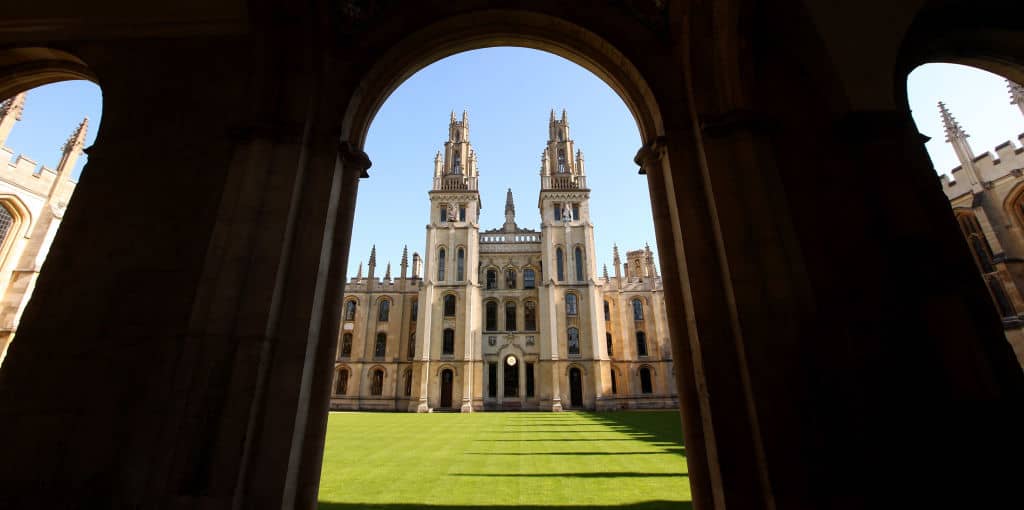Oxford is a city that makes you proud to be British: its beautiful dreaming spires attract tourists and the cleverest students from across the world. But is there something darker lurking beneath the glorious architecture? Some Oxford students think so.
‘Uncomfortable Oxford’ is a student-run company which, for £13, takes you on a tour of the city centre. It promised to raise difficult questions about the university and society. ‘Through unique walking tours, we generate discussions about racial inequality, gender and class discrimination, and legacies of empire,’ its website says.
The group met outside Carfax Tower, the last remnant of a church standing at the centre of Oxford. The day’s party consisted of a scattering of tourists, some interested students, an American who insisted on wearing a face mask for an activity which took place entirely outside on a windy day, and one undercover Spectator contributor.
It’s difficult to be uncomfortable when your view is the new orthodoxy
Carfax Tower was the perfect place to begin with a discussion of the history of ‘town and gown’, overlooking as it does the site of the St Scholastica Day riot of 1355. It may come as a surprise to the modern inhabitants of university towns – where students are known and loved as diligent and sober scholars – but the earliest cohorts at Oxford University caused considerable ill-feeling in the town by drinking to excess, showing off their wealth, and generally acting like entitled delinquents.
It was precisely this sort of behaviour that triggered the infamous riot, which turned into a three-day rampage ending with 93 people dead. It did not do a great deal for relations between the university and the town. We were invited to consider how this divide between scholars and townsfolk still exists today. Fair enough; I can’t say I mixed much with the locals during my postgraduate days.
Then again, I didn’t mix with them much at York either, or as a professional working in London. From this I drew the twin observations that people self-sorting into intellectual circles is a phenomenon with causes beyond historical legacies, and that I am a misanthrope. Does that count as progress?
The next stop was the Rhodes building of Oriel College and the infamous statue. Being both quite small and high up, it had to be pointed out to the non-Oxonians in the group. A brief history of ‘Rhodes Must Fall’ followed – in order to decolonise Oxford, a South African political movement had been imported – its thoughts on statues and the curriculum, and how it had eventually died down before returning with a vengeance in 2020. That time around, institution after institution had fallen in line with calls for the statue to go, until it became clear that there would be too many legal barriers to its removal. With the group on my walking tour almost entirely agreed that the statue should go (and the sole member in favour of its retention studiously keeping his mouth shut), we moved on.
The next stop was All Souls. This began with a brief history of Christopher Codrington, the son of a wealthy plantation owner, who had left a bequest for the construction of the college’s library. In 2017, the college added a memorial plaque to the slaves at the library’s entrance; in 2020, it ceased calling it the Codrington Library, made donations to Codrington College in Barbados, and set up three fully-funded scholarships for Caribbean graduate students. Again, with almost everyone on the tour agreeing on what should be done and many of those actions taken, discussion was somewhat muted, consisting largely of whether the plaque should be relocated.
This set the tone for the remainder of the tour. Outside the university library, conversation focused on whether the plaque in honour of the first black man to attend Oxford was too high upon the wall of Logic Lane. A room in the history faculty referencing Hugh Trevor-Roper had been renamed after Merze Tate, the first female African American graduate of the university. Was this sufficient recognition? Was renaming the right approach? And so on.
So what did I think of it? What surprised me was that I wasn’t really uncomfortable. I can see that it might have caused a stir when it first started, but at this point not only have the various protesters got most of what they want, the colleges, charities, and much of the press are pretty favourably disposed to their point of view. It’s difficult to be uncomfortable when your view is the new orthodoxy.







Comments